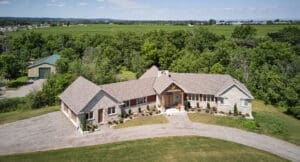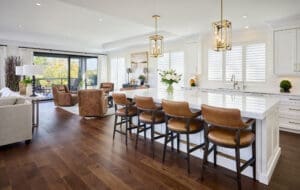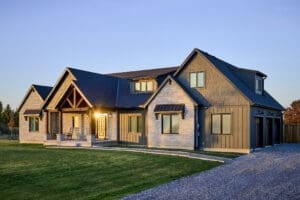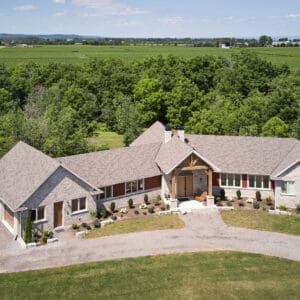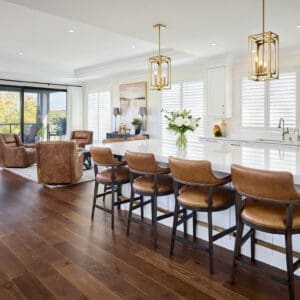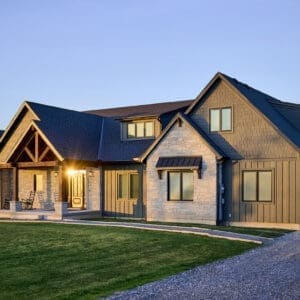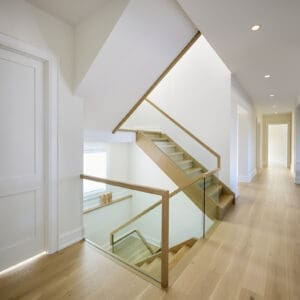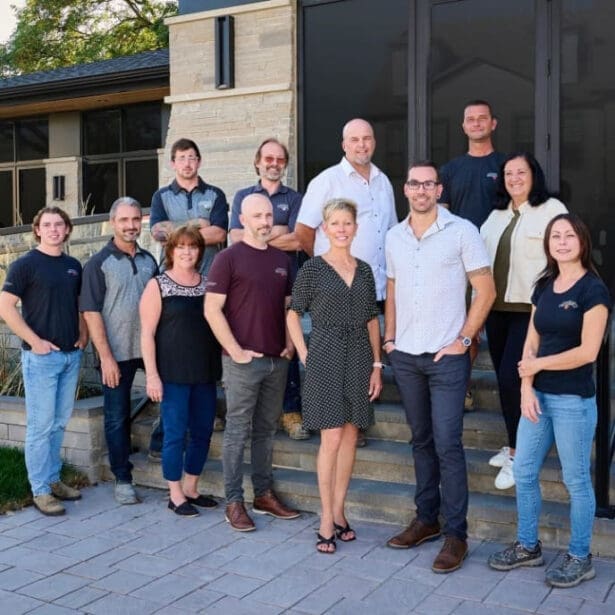When designing your custom home, one of the most critical decisions you’ll face is choosing the right building materials. Each material comes with its own set of advantages and disadvantages, and understanding these can help you make informed choices that align with your budget, aesthetic preferences, and long-term goals. At Homes By Hendriks, we’re committed to helping you build a home that’s both beautiful and functional. Here’s a detailed comparison of popular building materials to guide you in selecting the best options for your custom home.
Wood
Pros:
- Aesthetic Appeal: Wood offers a warm, natural look that can add character and charm to any home. It’s versatile, fitting well with various architectural styles from rustic to modern.
- Insulation Properties: Wood has good thermal insulation properties, helping to regulate indoor temperatures.
- Workability: It’s relatively easy to work with, allowing for custom designs and intricate detailing.
Cons:
- Maintenance: Wood requires regular maintenance to protect against rot, insects, and weathering. It may need to be sealed or painted periodically.
- Durability: While strong, wood can be susceptible to damage from termites, moisture, and fire.
- Cost: High-quality wood can be expensive, and costs can rise significantly for rare or exotic species.
Brick
Pros:
- Durability: Brick is highly durable and resistant to weathering, fire, and pests. It can last for centuries with minimal maintenance.
- Energy Efficiency: Brick provides excellent thermal mass, helping to regulate indoor temperatures and improve energy efficiency.
- Low Maintenance: Once installed, brick requires very little upkeep compared to other materials.
Cons:
- Cost: Brick is generally more expensive than other building materials, both in terms of material costs and labor for installation.
- Limited Flexibility: Brickwork can be labor-intensive and less flexible in terms of design modifications.
- Weight: The weight of brick can put more stress on a building’s foundation and may require additional structural support.
Stone
Pros:
- Longevity: Stone is extremely durable and can last for generations with proper care. It’s resistant to fire, pests, and weather.
- Aesthetic Appeal: Stone provides a timeless, natural look and can add significant curb appeal to a home.
- Insulation: Stone has good insulating properties and can help regulate indoor temperatures.
Cons:
- Cost: Stone is one of the most expensive building materials due to its cost and the labor required for installation.
- Installation: Stonework is labor-intensive and requires skilled masons, which can drive up costs.
- Weight: Like brick, stone is heavy and may require additional structural reinforcement.
Vinyl Siding
Pros:
- Affordability: Vinyl siding is relatively inexpensive compared to wood, brick, or stone.
- Low Maintenance: It doesn’t require painting and is resistant to rot, insects, and weather.
- Variety: Available in a range of colors and styles, vinyl siding can mimic the look of wood or other materials.
Cons:
- Durability: While it’s resistant to many issues, vinyl can become brittle and crack over time, especially in extreme temperatures.
- Aesthetic Limitations: Some homeowners find that vinyl doesn’t offer the same aesthetic appeal as natural materials.
- Environmental Impact: Vinyl is made from synthetic materials, which may be a concern for environmentally-conscious buyers.
Fiber Cement Siding
Pros:
- Durability: Fiber cement is resistant to fire, pests, and rot. It can withstand harsh weather conditions and has a long lifespan.
- Low Maintenance: It doesn’t require frequent painting and is easy to clean.
- Versatility: Available in various styles and textures, including options that mimic wood or stucco.
Cons:
- Cost: Fiber cement siding is more expensive than vinyl but typically less than stone or brick.
- Weight: It’s heavier than vinyl, which can add to installation complexity and cost.
- Installation: Requires professional installation due to its weight and the need for special tools.
Metal (Steel or Aluminum)
Pros:
- Durability: Metal siding is highly resistant to weather, fire, and insects. It has a long lifespan and minimal maintenance needs.
- Energy Efficiency: Reflective metal surfaces can help with energy efficiency by reflecting heat away from the house.
- Modern Aesthetic: Metal offers a sleek, contemporary look and is available in various finishes and colors.
Cons:
- Cost: Metal siding can be more expensive than vinyl and some other materials.
- Noise: It can be noisy during rain or hail, which might be a consideration in some regions.
- Denting: Metal can dent from impacts, which may require repairs or replacements.
Concrete
Pros:
- Strength: Concrete is incredibly strong and durable, making it ideal for foundations and structural elements.
- Fire Resistance: It’s highly resistant to fire and weather, providing excellent protection.
- Energy Efficiency: Concrete walls offer good thermal mass, helping to regulate indoor temperatures.
Cons:
- Cost: While concrete itself may be affordable, the cost of forming and pouring concrete can be high.
- Aesthetics: Concrete may require additional treatments or finishes to enhance its appearance.
- Cracking: Concrete can crack over time, especially if not properly mixed or cured.
Final Thoughts
Choosing the right building materials for your custom home involves balancing aesthetics, durability, cost, and maintenance. At Homes By Hendriks, we work closely with you to understand your preferences and needs, ensuring that the materials selected will not only enhance your home’s beauty but also its longevity and value. Whether you prioritize the classic charm of brick, the modern appeal of metal, or the versatility of fiber cement, our team is here to guide you through every decision, creating a home that truly reflects your vision.
